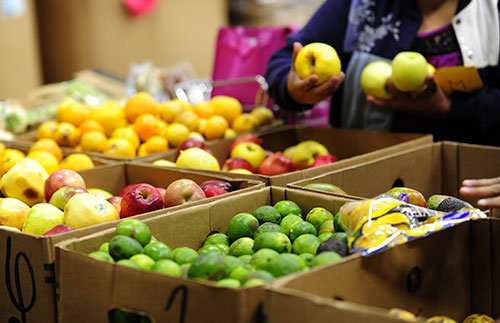The Supplemental Nutrition Assistance Program (SNAP) is an important program that so many working families, kids, seniors and people with disabilities rely upon. It also allows kids whose families receive SNAP to also be eligible for school meals. Linking these two programs ensures families and kids have access to the nutrition they need.
But right now, this program and the people who rely upon it are under attack.
A proposed rule from the United States Department of Agriculture (USDA) would impact a provision known as broad based categorical eligibility. Changing this rule will take this critical food assistance away from over 3 million people who are struggling to make ends meet and 500,000 children receiving free and reduced priced school meals.
The people receiving SNAP are primarily working families, kids and seniors. By removing the categorical eligibility as an option for states, more people will go hungry and more families working to make ends meet and seniors will struggle to put food on the table.
The Details
Broad based categorical eligibility allows states to adjust income cutoffs and asset limits so that working families, seniors and people with disabilities don’t abruptly lose much of their SNAP benefits when they earn slightly more or are able to save a needed cushion. Over 40 states use this flexibility to also align SNAP with other benefit programs to make it easier on the state to administer. Anyone who applies for SNAP under this or other provisions must still go through all the needed paper work and requirements to receive SNAP and their benefit amounts are adjusted when they are able to earn more.
Here are a few items to keep in mind:
Categorical eligibility does not allow households to enroll automatically. Households must still complete the regular SNAP application process, which has rigorous procedures.
Categorical eligibility targets working families. These households make just a little too much in income or have just a little too much in assets to meet the SNAP income and asset tests, but have household expenses, for example for child care or housing that consume a sizeable share of their income.
Categorical eligibility allows states to address SNAP’s “benefit cliff.” By allowing workers to keep SNAP eligibility as their income rises above the federal income cut off, categorical eligibility ensures that SNAP benefits slowly taper off, instead of stopping abruptly and creating a situation where a higher paying job or more work hours would result in less income.
Take Action
Right now, this cut is just a proposed rule from the USDA and they are required to listen to your feedback on this rule. Everyone is welcome to submit a comment on this rule and the USDA is required to review every unique comment. Whether you just want to share a few words or a few pages about this rule, your comment will be part of the action to fight back against it.
If you believe that kids cannot learn when they are hungry, working families should not be penalized when they are already struggling to make ends meet, or that seniors need our support not more cuts to programs they rely upon, then please comment today!
While Philabundance and other emergency food providers will continue to feed people who come to us, we know we cannot make up the difference of the SNAP program and we so appreciate your support as we push back against it.




